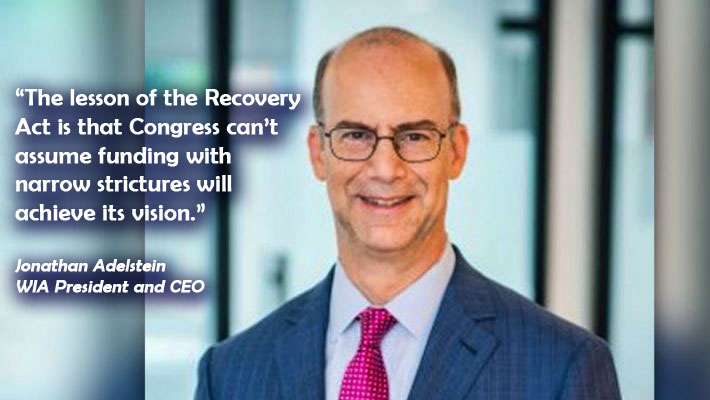
WIA President and CEO Jonathan Adelstein was the featured speaker at The Media Institute’s Communications Forum luncheon today. In his remarks, Adelstein underscored the valuable role wireless broadband should play in the infrastructure legislation under consideration in Congress and the importance of technological flexibility. He relayed the importance of flexibility in his experience overseeing the Rural Utilities Service for the Obama-Biden administration and the lessons learned when distributing broadband funding during the Recovery Act.
“The bipartisan Senate group is charting a course that will get broadband deployed quicker and bring mobility along with high speeds to rural America. A course that will win the race to 5G. A course that will create millions of jobs and over a trillion dollars in economic development. Congress and the Administration are now positioned to enact a program that would achieve its goals more easily than if it depended on a single technology. By providing needed flexibility, the bipartisan agreement will be more likely to garner qualified applications for more unserved areas,” Adelstein said during the event.
“Wireless gets built to deliver service more quickly, it provides mobility, it serves public safety, it fights climate change, and it’s resilient when disaster strikes. These are urgent needs the bipartisan group is looking to address by letting wireless compete for funding.”
Adelstein said that crafting a funding plan needs careful planning – not just easy answers.
He said the fiber-only approach – though well-intentioned – will not work.
“I must admit our industry was taken a bit by surprise when so many policymakers aimed for what they called a ‘future proof’ strategy, mandating 100Mbps speeds up and down, which was code for ‘fiber-only.’ But this idea hadn’t been properly vetted considering the complexities of the telecom networks,” said Adelstein.
“The bipartisan agreement – if reports we are hearing are correct – will avert those problems. The bipartisan agreement deserves our support since it’s moving toward a flexible standard that allows wireless to compete for funding.”
“The lesson of the Recovery Act is that Congress can’t assume funding with narrow strictures will achieve its vision. I learned as an Administrator the agency doesn’t choose who applies. Agencies can only consider what comes through their door. And should only fund those operators that are not only willing, but able to demonstrate a plan that is both financially and technically feasible.”
Adelstein’s full remarks can be found on WIA’s website.


















